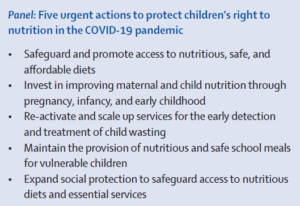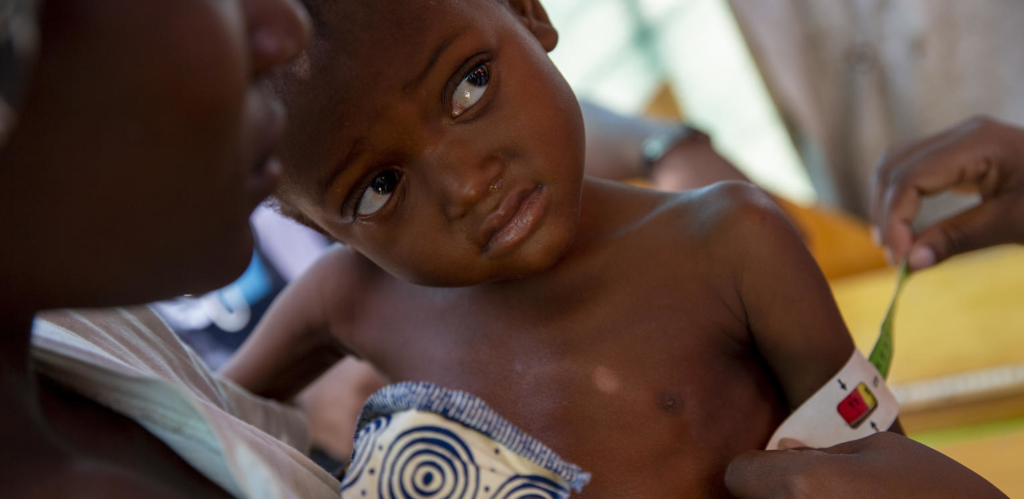Child malnutrition and COVID-19: the time to act is now
* Call to action orginally published by The Lancet and signed by: Henrietta H. Fore, UNICEF Executive Director; Qu Dongyu, FAO Director-General; David M. Beasley, WFP Executive Director; and Dr. Tedros A. Ghebreyesus, WHO Director-General The COVID-19 pandemic is undermining nutrition across the world, particularly…
David M. Beasley, WFP Executive Director; and Dr. Tedros A. Ghebreyesus, WHO Director-General
The COVID-19 pandemic is undermining nutrition across the world, particularly in low-income and middle- income countries (LMICs). The worst consequences are borne by young children. Some of the strategies to respond to COVID-19—including physical distancing, school closures, trade restrictions, and country lock- downs—are impacting food systems by disrupting the production, transportation, and sale of nutritious, fresh, and affordable foods, forcing millions of families to rely on nutrient-poor alternatives. Strained health systems and interruptions in humanitarian response are eroding access to essential and often life-saving nutrition services. Social protection systems in many LMICs are overloaded as vulnerable families struggle to access the food and services they need in the context of an economic downturn.
Malnutrition could exacerbate the effects of COVID-19 in mothers and children. At the same time, more children are becoming malnourished due to the deteriorating quality of their diets, interruptions in nutrition and other essential services, and the socioeconomic shocks created by the pandemic in LMICs. New estimates by Derek Headey and colleagues3 in an accompanying Comment in The Lancet suggest that without timely action, the global prevalence of child wasting could rise by a shocking 14·3%. With an estimated 47 million children younger than 5 years affected by wasting globally before the COVID-19 pandemic, this would translate to an estimated additional 6·7 million children with wasting during the first 12 months of the pandemic—80% of them in sub-Saharan Africa and south Asia—and more than 10 000 additional child deaths per month during this same period.
With services for the prevention and treatment of wasting to a large extent up-ended in LMICs, millions of children are at risk of not receiving the care they need to survive and thrive. UNICEF reports from the early months of the COVID-19 pandemic suggest a 30% reduction in the coverage of essential nutrition services in LMICs and declines of 75–100% under lockdown contexts. Our agencies estimate that a minimum of USD2·4 billion is needed immediately to protect these children, prevent and treat malnutrition, and avoid human loss. This USD2·4 billion estimate includes an essential package of four life-saving interventions: prevention of wasting in children at risk; treatment for children who are wasted; biannual vitamin A supplementation for children aged 6-59 months (90% coverage); and mass communication for the protection, promotion, and support of breast- feeding that focuses on caregivers or families of children aged 0–23 months.
The estimated increase in child wasting is only the tip of the iceberg. The COVID-19 pandemic is also expected to increase other forms of child malnutrition, including stunting, micronutrient deficiencies, and overweight. The global community’s failure to act now will have devastating long-term consequences for children, human capital, and national economies.
 As leaders of four UN agencies, we are issuing a call for action to protect children’s right to nutrition in the face of the COVID-19 pandemic. This requires a swift response and investments from governments, donors, the private sector, and the UN. Five actions must be taken and tracked immediately (panel).
As leaders of four UN agencies, we are issuing a call for action to protect children’s right to nutrition in the face of the COVID-19 pandemic. This requires a swift response and investments from governments, donors, the private sector, and the UN. Five actions must be taken and tracked immediately (panel).
First, access to nutritious, safe, and affordable diets needs to be safeguarded and promoted as a cornerstone of the response to COVID-19. This can be done by protecting food producers, processors, and retailers; discouraging trade bans; and designating food markets to be essential services and keeping them functioning and safe for workers and consumers.
Second, investments are needed to improve maternal and child nutrition through pregnancy, infancy, and early childhood by protecting breastfeeding and preventing the inappropriate marketing of infant formula in the context of COVID-19; securing children and women’s access to nutritious and diverse foods; and providing accurate information on infant feeding to caregivers.
Third, services for the early detection and treatment of child wasting need to be re-activated and scaled up while maintaining and expanding prevention and other nutrition services, including vitamin A supplementation for children, and micronutrient supplementation and nutritional support for pregnant and breastfeeding women, and minimising the risk of infection.
Fourth, maintain the provision of nutritious and safe school meals for vulnerable children through home delivery, take-home rations, and cash or vouchers when schools are closed. These efforts also need to ensure adequate nutritional value of school meals or food packages and avoid the provision of unhealthy foods and beverages.
Finally, social protection to safeguard access to nutritious diets and essential services among the poorest households, including access to fortified foods, needs to be expanded. Such schemes must reach families with young children and pregnant and breastfeeding women. Our teams in countries everywhere stand ready to support governments and partners in implementing these five actions now. We must step forward together with sustained action and investments on nutrition today and deny the COVID-19 crisis an intergenerational legacy of hunger and malnutrition in children.
© 2020. United Nations. Published by Elsevier Ltd/Inc/BV. All rights reserved
